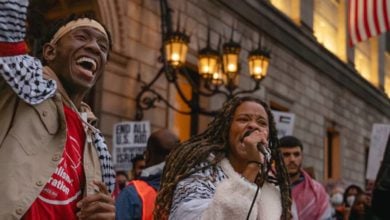Residents of New Bedford, Massachusetts, in the “No BID New Bedford” movement are celebrating their victory against the proposed creation of a Business Improvement District that would have privatized public space downtown and displaced local communities. The victory was a result of months of grassroots organizing.
Dozens of New Bedford residents and small business owners organized meetings, protests, and a petition opposing the creation of a BID. On July 17, a week before City Council was set to vote on the proposal, BID supporters withdrew their proposal from consideration.
“We all mobilized immediately and came together,” said Elissa Paquette, owner of New Bedford’s fashion boutique Calico and a central figure in the “No BID New Bedford” movement. “This downtown belongs to the residents of New Bedford.”
What is a BID? A tool of gentrification and displacement
A BID — sometimes known by other names such as a Tourist Improvement District — creates a designated area where property owners pay a fee to fund projects such as enhanced security, marketing, “beautification” and street cleaning. These projects are designed to attract tourists and upscale clientele rather than serve the existing community.

BIDs often lead to increased property values as the district becomes more attractive to wealthy investors and high-income residents. This drives up rents and property taxes, making it difficult for longtime residents and small, local businesses to afford to stay in the area. As a result, working class tenants and mom-and-pop shops are often forced out, replaced by wealthier newcomers and larger, corporate-owned establishments.
BIDs are often marketed as a tool for “urban revitalization” that will help all residents. But they are primarily supported by big businesses and wealthy interests. They are overseen by a private board typically composed of property owners within the district.
“A BID privatizes the land, uses an undemocratic system, and increases property value with total disregard for people who are already struggling with the cost of living,” said Marcus Coward, a community activist and school committee nominee.
Thousands of BIDs exist across the United States, including 10 in Massachusetts.
“A synonym for gentrification.”
The proposed BID in New Bedford would have opened the door to fully commodifying the city’s downtown area — an area known for social and cultural events that bring the community together. “We all knew how important it was to stop this because of how damaging it could be to downtown New Bedford and to New Bedford as a whole,” said Paquette.

One key supporter of New Bedford’s BID proposal was Marco Li Mandri, a wealthy San Diego-based developer and “volunteer consultant” for the project. Li Mandri’s company New City America proudly advertises that it “has established 90 Business Improvement Districts/Community Benefit Districts across the U.S.”
As Coward said, a BID “can be a synonym for gentrification.”
“We’ll be ready.”
The BID is a capitalist tool designed to extract profit from our communities at the expense of working class residents. Development decisions should center on the wants and needs of the community, not outside investors. Development should create opportunities for residents to thrive, instead of displacing people with rising rents.
“No BID New Bedford” organizers told Liberation News that they know the corporate elite will try again to make a buck off New Bedford. But with the collective experience of organizing and winning against the downtown BID, Coward says, “We won’t have to get ready. We’ll be ready.”





